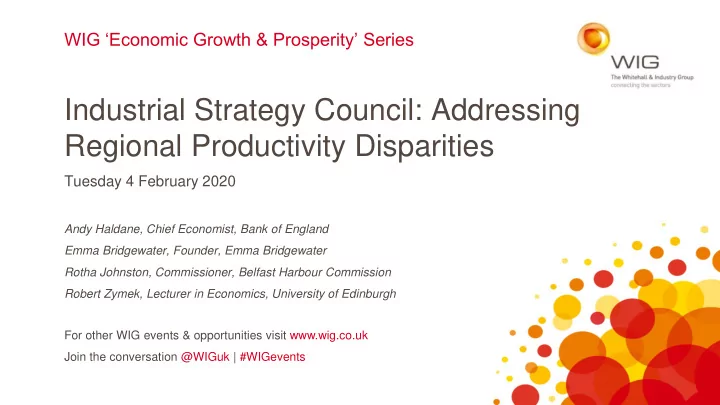

WIG ‘Economic Growth & Prosperity’ Series Industrial Strategy Council: Addressing Regional Productivity Disparities Tuesday 4 February 2020 Andy Haldane, Chief Economist, Bank of England Emma Bridgewater, Founder, Emma Bridgewater Rotha Johnston, Commissioner, Belfast Harbour Commission Robert Zymek, Lecturer in Economics, University of Edinburgh For other WIG events & opportunities visit www.wig.co.uk Join the conversation @WIGuk | #WIGevents
WIG ‘Economic Growth & Prosperity’ Series Industrial Strategy Council: Addressing Regional Productivity Disparities Tuesday 4 February 2020 Andy Haldane, Chief Economist, Bank of England For other WIG events & opportunities visit www.wig.co.uk Join the conversation @WIGuk | #WIGevents
WIG ‘Economic Growth & Prosperity’ Series Industrial Strategy Council: Addressing Regional Productivity Disparities Tuesday 4 February 2020 Robert Zymek, Lecturer in Economics, University of Edinburgh For other WIG events & opportunities visit www.wig.co.uk Join the conversation @WIGuk | #WIGevents
Industrial Strategy Council UK Regional Productivity Differences: An Evidence Review Industrial Strategy Council Birmingham, 4 February 2020 Robert Zymek* *University of Edinburgh and CESifo; robert.zymek@ed.ac.uk
UK Regional Productivity Differences • Industrial Strategy White Paper (2017): – ‘unless we improve productivity, we cannot raise living standards and quality of life for all our citizens’ – ‘the UK has greater disparities in regional productivity than other European countries’ – goal: improving the foundations of productivity ‘ in all parts of the country’ • Productivity = Income / hour worked • More productive regions tend to do better along a range of indicators: – higher disposable incomes – better education outcomes – higher life expectancy – higher labour-market participation 5
UK Regional Productivity Differences Productivity across UK NUTS2 regions, 2017 (Souce: ONS) 6
UK Regional Productivity Differences Top/bottom region productivity gap, UK and 18 EU countries in 2017 (Source: Eurostat) 7
UK Regional Productivity Differences UK productivity differences across NUTS1 regions, 1901-2017 8
UK Regional Productivity Differences UK productivity differences across NUTS1 regions, 1901-2017 9
UK Regional Productivity Differences • Over the past decade: 1. some cities (London, Edinburgh, Bath, Bristol…) have been “steaming ahead” 2. coastal areas have been falling further behind 3. regional “clubs” (North, South East, Wales, Scotland…) have continued to account for >50% of local productivity disparities Productivity growth across NUTS3 regions, 2008-2017 10
Causes of Regional Productivity Differences • Regional productivity differences can be attributed to differences in: 1. Workforce attributes: skill, health, motivation of the workforce a place is able to attract 2. Capital and infrastructure: machinery, equipment, infrastructure supporting local economic activity 3. Geography and local institutions: inherent characteristics (location, culture) conducive to economic activity 4. Sectoral specialisation: composition of local economic activity (manufacturing? services?) • In practice, high-productivity regions tend to do well on all four! 11
Causes of Regional Productivity Differences • Three narratives about the ”root causes” of regional differences: 1. Place fundamentals: Geography, local culture, governance, infrastructure shape economic activity ⇒ workforce composition, investment, productivity 2. Agglomeration: • ” localisation economies ”: specialised firms benefit from the ability to trade with other firms in their industry (e.g. Coventry-Warwickshire automotive cluster) • “ urbanisation economies ”: firms benefit from a common set of local resources offered by cities (e.g. infrastructure, market for specialist workers, knowledge transfer) 3. Sorting: People choose to live and work alongside similar people ⇒ differences in productivity of places due to differences in productivity of individuals 12
UK Regional Policy Context • Institutions and targets of UK regional policy have changed frequently over the past decades: – 1997-2010: Devolved Administrations (DAs) and 9 Regional Development Agencies (RDAs) in England to tackle productivity disparities – 2010-2015: RDAs replaced with 38 Local Enterprise Partnerships (LEPs); less dedicated funding and reduced emphasis on productivity – Since 2017: LEPs must develop Local Industrial Strategies (LISs) with local partners and government to access funding; renewed emphasis on productivity • So far, 7 LISs have been published: https://www.lepnetwork.net/lep- activities/local-industrial-strategies/ 13
Lessons for UK Regional Policy 1. More continuity is needed! – A tendency to abolish and re-create institutions has hampered long-term planning and the build up of a meaningful institutional memory 2. Local growth strategies should be robust and realistic. – Strategies must be “narrative - proof”, employing a holistic approach across a range of policy interventions – They ought to aim for meaningful, sustained increases in productivity… – …while recognising that dramatic turnarounds are rare 3. Focus on places furthest from realising their potential. – Contributes to balancing growth across the UK… – …and ensures highest marginal return from interventions 4. There are evidence gaps which need to be filled! 14
WIG ‘Economic Growth & Prosperity’ Series Industrial Strategy Council: Addressing Regional Productivity Disparities Tuesday 4 February 2020 Andy Haldane, Chief Economist, Bank of England Emma Bridgewater, Founder, Emma Bridgewater Rotha Johnston, Commissioner, Belfast Harbour Commission Robert Zymek, Lecturer in Economics, University of Edinburgh For other WIG events & opportunities visit www.wig.co.uk Join the conversation @WIGuk | #WIGevents
Upcoming Events Tuesday 10 March, Cardiff Dame Shan Morgan, Permanent Secretary, and Emma Watkins, Deputy Director, EU Exit & Strategic Policy, Welsh Government Wednesday 18 March, Newcastle The future of the Ageing 'grand challenge ‘ With speakers from the National Innovation Centre for Ageing and UK Research and Innovation Wednesday 8 April Maximising the impact of apprenticeships With speakers from the Institute for Apprenticeships and Technical Education and the Department for Education WIG Leadership Programmes Speak to one of the team for more details www.wig.co.uk #WIGevents @wiguk
Recommend
More recommend